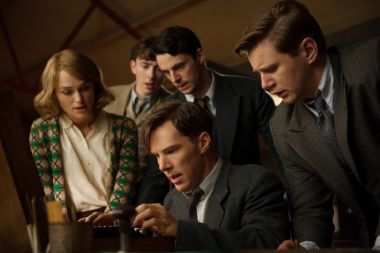Whatever our beliefs, Christians must unite to support gay pardons

The Imitation Game, the tale of World War II codebreaker Alan Turing, may have been pipped to the post at last weekend's BAFTA Awards ceremony by Boyhood and The Theory of Everything, but the fact that it was nominated in so many categories demonstrates, beyond doubt, its influence and impact.
Turing played a pivotal role in breaking the German Enigma code, through which it is estimated the conflict with the Nazi regime was shortened by around two years, thus saving millions of lives. However, as the whole nation knows by now, he was, within a few short years, prosecuted, convicted and sentenced as a criminal.
Was this because he was a traitor to his country? No. Was it because he was involved in theft or fraud? No. Was it because he had somehow tried to profit from his insider knowledge? No. Alan Turing was condemned as a criminal and subjected to the inhumane torture of being chemically castrated because he was sexually attracted to men and chose to act on his instincts.
Turing was convicted of gross indecency in 1952 under Section 11 of the Criminal Law Amendment Act 1885. Not only were the remaining years of his life overshadowed by this conviction, but in June 1954 he died from cyanide poisoning. An inquest concluded that he had committed suicide. However, biographers and friends dispute this finding and suggest either that his death was an accident or that he was killed by security services because he was regarded as a high security risk.
It was not until 2009 that the then Prime Minister, Gordon Brown, offered an "unequivocal apology" for the way Turing was treated and four years later in 2013 that he was granted a posthumous pardon by the Queen under the Royal Prerogative of Mercy – almost 60 years after his death.
The Imitation Game did what so many great films do well. It powerfully confronted its audience with the human and emotional aspect of Turing's story, not just the cold historical facts. And, in this case, it's clear that it also had a very dramatic impact on Benedict Cumberbatch, the actor who portrayed Alan Turing.
At the end of last month, the heterosexual actor, so moved by the story, launched along with Stephen Fry and members of Turing's family a campaign calling for the estimated 49,000 other homosexual men who were prosecuted and convicted under the same act to be pardoned. They published an open letter asking the Government to act, which more than 60,000 have signed so far.
The letter states: "The UK's homophobic laws made the lives of generations of gay and bisexual men intolerable." It continues: "The apology and pardon of Alan Turing are to be welcomed but ignores over 49,000 men who were convicted under the same law, many of whom took their own lives."
Some wonder why the letter is only addresses the plight of gay men. The answer is simple. Lesbian acts have never been outlawed in British law. However, the more sobering truth is that an estimated 15,000 of these men are believed to still be alive – all elderly now, but each living with the pain of their past treatment and the stigma of a criminal record.
Over the past two years my views that the Bible supports rather than condemns faithful, committed same-sex relationships have become well known. This has led some to agree with me and others to voice their disagreement. But when I first heard about Benedict Cumberbatch's campaign, an idea struck me. This is an opportunity for people in the Church to come together and stand united – regardless of their views on the legitimacy of same-sex relationships or gay marriage.
I've had numerous conversations with those who, though they support gay people, cannot accept that the Bible endorses same sex relationships. But I know for a fact that they would all be united with me in being appalled by the idea of someone being chemically castrated by having their body pumped full of estragon. Several friends of mine would say they don't think a same-sex relationship is 'God's best' for anyone, but they are all horrified by the thought that people who were found to have performed a same-sex act, in private, with another consenting adult, were shamed and imprisoned, just a few decades ago.
It's time that all of those who were convicted of similar offences to Alan Turing were pardoned. I believe it to be very wrong that other men convicted of exactly the same offence as him are not even being offered a simple apology, let alone a royal pardon.
That is why today I am launching an Open Letter, which will allow Christians from across the denominations and a wide spectrum of opinion over same-sex relationships to add their voice to the campaign. I hope it will bring resolution to the injustice inflicted on so many by history.
Why am I encouraging people to sign something distinct from the original letter launched by Benedict Cumberbatch? The answer is simply this: many Christians may not be the rampant homophobes that people describe us to be, but rightly or wrongly this is too often how we're seen by wider society. This is our opportunity, as the Church, to make it clear – plainly, explicitly and unequivocally – that precisely because we follow the liberating example of Jesus, we add our voice to this campaign. Not despite it. We can get this right. We can make a difference. We can help lift the wrong that has been done to these men.
Please click here to read and sign the letter http://www.oasisuk.org/openchurch/pardon











